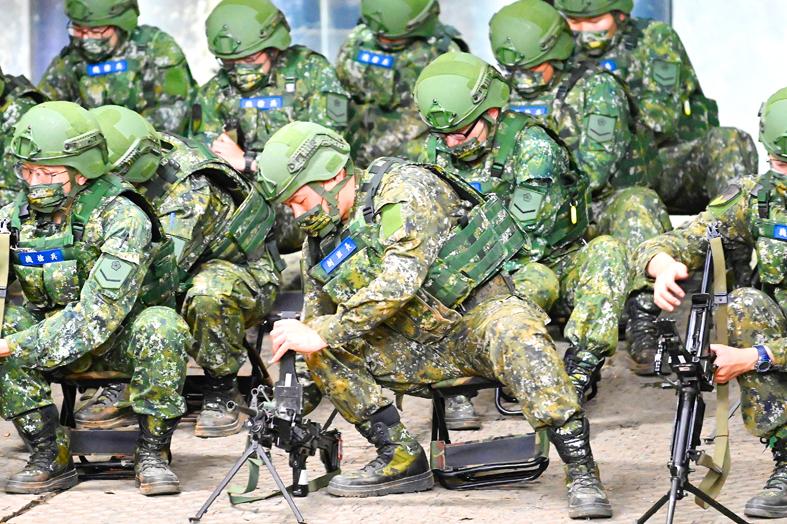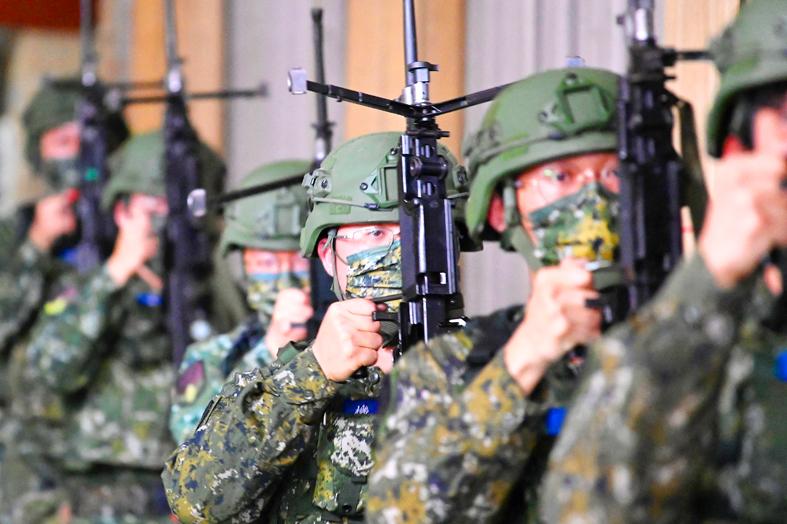The government is to assess whether the military conscription period needs to be lengthened to bolster Taiwan’s defense capabilities, Executive Yuan spokesman Lo Ping-cheng (羅秉成) said yesterday.
Minister of the Interior Hsu Kuo-yung (徐國勇) on Monday told lawmakers that the measure could be vital to the nation’s ability to deal with existential threats.
Ukraine’s resistance against Russian aggression has been an inspiration to Taiwanese and a reminder that the nation’s survival is predicated on the will to defend it, Lo told a news conference following the weekly Cabinet meeting in Taipei.

Photo: Sam Yeh, AFP
The government’s focus is to augment the military reserve by creating mobilization plans and reservist training programs via the All-Out Defense Mobilization Agency, which was activated in January, he said.
However, the government acknowledges that there is a consensus among Taiwanese to extend military conscription and re-evaluate Taiwan’s military system, he said.
The support for conscription is evidence that Taiwanese are united in their resolve to defend the nation’s democracy, he said, adding that the government would proceed with this in mind.

Photo: Sam Yeh, AFP
The Ministry of the Interior and the Ministry of National Defense would examine the viability of proposals to extend military service, he said.
Separately yesterday, Democratic Progressive Party (DPP) Legislator Tsai Shih-ying (蔡適應) at a meeting of the legislature’s Foreign Affairs and National Defense Committee asked Deputy Minister of National Defense Bo Hong-hui (柏鴻輝) when his ministry could be expected to make a decision on lengthening conscription.
A decision to change the terms of military conscription must originate from the whole of government and the defense ministry is not prepared to discuss the issue of its own volition, Bo said.
The assessment should not take more than a year, he said.
Meanwhile, Chinese Nationalist Party (KMT) Legislator Liao Wan-ju (廖婉汝) and DPP Legislator Lin Ching-yi (林靜儀) told defense officials at the meeting that a civil defense pamphlet issued by the defense ministry is too brief and has unrealistic instructions.
Instruction to scan QR codes to get information about air raid shelters is questionable, as cell towers and Internet services are likely be targeted in a war, Liao said.
The defense ministry’s pamphlet contains virtually no practical advice for people to survive a war, whereas a Latvian civil defense booklet has 15 pages of useful material, Lin said.
The first edition of the defense ministry’s pamphlet was published to establish first principles, Bo said, adding that no specific instructions can be published before it discusses and tests ideas with local governments.
The annual Wan An air raid drill this year would provide one occasion for the government to gain a clearer picture about what civil defense strategies would be effective, he said.

CHAOS: Iranians took to the streets playing celebratory music after reports of Khamenei’s death on Saturday, while mourners also gathered in Tehran yesterday Iranian Supreme Leader Ayatollah Ali Khamenei was killed in a major attack on Iran launched by Israel and the US, throwing the future of the Islamic republic into doubt and raising the risk of regional instability. Iranian state television and the state-run IRNA news agency announced the 86-year-old’s death early yesterday. US President Donald Trump said it gave Iranians their “greatest chance” to “take back” their country. The announcements came after a joint US and Israeli aerial bombardment that targeted Iranian military and governmental sites. Trump said the “heavy and pinpoint bombing” would continue through the week or as long

TRUST: The KMT said it respected the US’ timing and considerations, and hoped it would continue to honor its commitments to helping Taiwan bolster its defenses and deterrence US President Donald Trump is delaying a multibillion-dollar arms sale to Taiwan to ensure his visit to Beijing is successful, a New York Times report said. The weapons sales package has stalled in the US Department of State, the report said, citing US officials it did not identify. The White House has told agencies not to push forward ahead of Trump’s meeting with Chinese President Xi Jinping (習近平), it said. The two last month held a phone call to discuss trade and geopolitical flashpoints ahead of the summit. Xi raised the Taiwan issue and urged the US to handle arms sales to

State-run CPC Corp, Taiwan (CPC, 台灣中油) yesterday said that it had confirmed on Saturday night with its liquefied natural gas (LNG) and crude oil suppliers that shipments are proceeding as scheduled and that domestic supplies remain unaffected. The CPC yesterday announced the gasoline and diesel prices will rise by NT$0.2 and NT$0.4 per liter, respectively, starting Monday, citing Middle East tensions and blizzards in the eastern United States. CPC also iterated it has been reducing the proportion of crude oil imports from the Middle East and diversifying its supply sources in the past few years in response to geopolitical risks, expanding

Pro-democracy media tycoon Jimmy Lai’s (黎智英) fraud conviction and prison sentence were yesterday overturned by a Hong Kong court, in a surprise legal decision that comes soon after Lai was jailed for 20 years on a separate national security charge. Judges Jeremy Poon (潘兆初), Anthea Pang (彭寶琴) and Derek Pang (彭偉昌) said in the judgement that they allowed the appeal from Lai, and another defendant in the case, to proceed, as a lower court judge had “erred.” “The Court of Appeal gave them leave to appeal against their conviction, allowed their appeals, quashed the convictions and set aside the sentences,” the judges